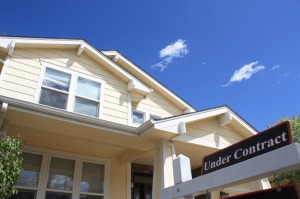The debate over density in Denver seems to have entered a new and ugly phase. From now on, if you live in a neighborhood zoned mainly for single-family homes and happen to oppose a nearby proposal for higher-density development, brace yourself: You are likely to be called a racist.
The tactic was on display in January during a dispute over an application by seven homeowners for a rezoning on South Holly Street in Hilltop to allow 23 condos. In the days before city council’s vote on the plan, developer Jason Lewiston declared, according to the Denverite news website, that the project was a “metaphor for the future of Denver. Are we going to retain whites-only, single-family zoning … or are we going to get past we going to get past race-based zoning from the 1960s?”

Kaboom! So opponents of higher density, whose motives have nothing to do with racism and everything to do with what they perceive as quality of life issues such as congestion and safety, are the moral equivalent of bigots fighting integration a half-century ago?
Alas, Lewiston is hardly alone in his view that single-family zoning is morally tainted. Minneapolis politicians cited historical racism when they voted last year to become the first big city to abolish single-family zoning. In Seattle, meanwhile, the planning commission released a report arguing that “the growing economic exclusivity of detached housing in single-family zones contributes to disparity along racial lines by continuing the legacy of excluding all but those who have the economic resources to buy homes.” That’s a bloated way of saying you need a good income to buy a home in Seattle’s soaring market, and that whites (Asians, too, in that city) are more likely to have the money.
This is not to deny that zoning in the past could be used as a tool of racial exclusion. As Slate (which applauded Minneapolis’ ban on single-family zoning) explained, “The U.S. Supreme Court struck down race-based zoning in 1917, but nine years later, found it constitutional for a Cleveland suburb to ban apartment buildings. The idea that you could legislate out not just gritty industrial facilities but also renters spread rapidly.” When single-family zoning was buttressed by red-lining in bank lending, “steering” by the real-estate profession and the lack of a significant black or Hispanic middle class, it did keep some neighborhoods white.
But to impose that history on today’s reality and broad-brush single-family zoning as a “whites only” policy is grotesquely unfair — and even bizarre in such progressive bastions as Minneapolis, Seattle and Denver.
I actually don’t have a position on the Hilltop project, which was ultimately blocked by five council members, and found myself sympathizing at times with each side during last month’s hearing. It also may be that a developer will build something less desirable on part of the land without rezoning.
Nor have I reflexively opposed higher density in Denver, some of which is clearly necessary to meet housing demand.
Ther![]() e is even a respectable (and essentially libertarian) case that widespread single-family zoning contributes to housing scarcity and should be tweaked to allow a few options — although I’ve not jumped to that side of the fence.
e is even a respectable (and essentially libertarian) case that widespread single-family zoning contributes to housing scarcity and should be tweaked to allow a few options — although I’ve not jumped to that side of the fence.
What is not respectable, however, is playing the race card in density debates in an attempt to seize the moral high ground and sully opponents.
The tactic is also tone deaf in a city in which recent growth, particularly in higher density central neighborhoods, has resulted in a whitening of the overall population. A report last year by the Downtown Denver Partnership on six neighborhoods whose population has tripled since 2000 leaves no doubt. These newcomers have been overwhelmingly white and single. This was the subtext behind the protests and vandalism that erupted in 2017 in response to a sign by a Five Points coffee shop praising gentrification.
Councilman Kevin Flynn pointed out another inconvenient fact in commenting on the project. His heavily single-family district in southwest Denver is both relatively affordable and “majority minority.”
It would be nice if we could have a debate in which both sides acknowledged there are trade-offs in pursuing density — benefits as well as downsides. Yet that seems elusive. Some opponents seem reluctant to concede that scarcity is a prime component in housing prices, or that any additional density is desirable. And some officials in the Hancock administration and on city council seem unwilling to admit that high-density cities here and around the world are far more likely to be subject to severe traffic congestion than low-density cities — even when mass transit is superb.
So skirmishes over density will be bitter. They will become positively toxic, however, if some density proponents are going to insist that single-family zoning is a tool of segregation.
Vincent Carroll is the former editorial page editor of both the Rocky Mountain News and The Denver Post, where a version of this column first appeared.


